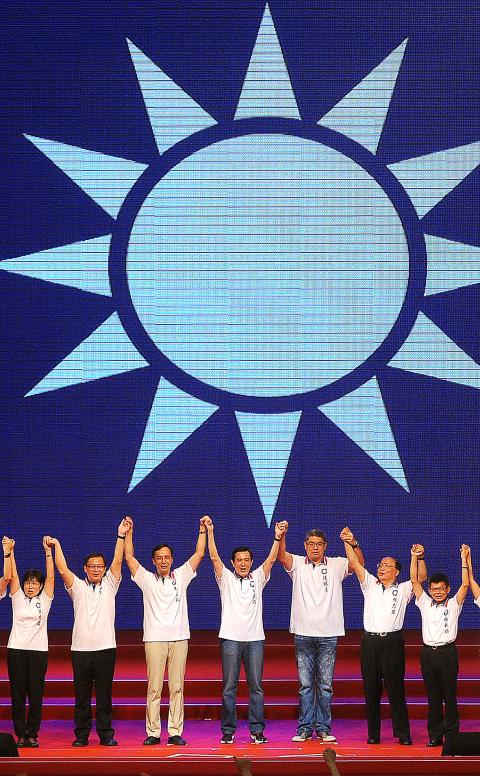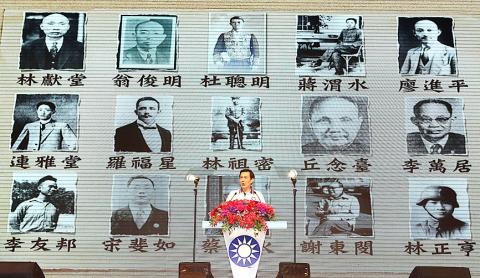President Ma Ying-jeou (馬英九), in his capacity as Chinese Nationalist Party (KMT) chairman, yesterday went on the offensive, aiming to boost support for the party in the Nov. 29 elections, charging that the Democratic Progressive Party (DPP) has hindered the nation’s progress.
In his speech at the KMT national congress held in Chiayi City, Ma accused the DPP of trampling on the democratic spirit of majority decisionmaking by occupying the podium at the Legislative Yuan 92 times over the past six years, preventing bipartisan dialogue and engaging in what he termed endless boycotts.
“This attitude of extreme conceit bent on excluding outsiders, humiliating officials and playing games with specific bills is the biggest crisis Taiwan currently faces,” Ma said.

Photo: Wang Min-wei, Taipei Times
Ma said the DPP used violent tactics that would not help solve any of the nation’s problems, adding that if the opposition party truly “loved Taiwan” as it said, it should cease actions that lead to infighting and wasting resources.
“Return to the true path of democracy and persuade the people with civilized conduct,” Ma said.
The public’s loyalty to the system far exceeds the interests of any political party, or concerns over an individual candidate’s success or failures at elections, Ma said, adding that such was the value of Taiwanese democracy and why the governments and people of the world have praised the nation for its peaceful transition of government.

Photo: CNA
Ma said that the DPP used “all sorts of reasons” to malign the rightful power of government accorded to the KMT by the Constitution and are attempting to bully the majority into submitting to the will of the few. Ma then accused the DPP of abusing its role as the opposition party.
Appealing to voters for support in the Nov. 29 elections, Ma said “The KMT is a party local to Taiwan, it is progressive and forward-looking, practical and responsible, and it is a diverse party that is willing to embrace changing times.”
Ma said that people spread across Taiwan, Penghu, Kinmen and Matsu might have come from different places and have different histories, but the acceptance of multicultural society is what makes Taiwan precious.
“The Aborigines may believe in ancestral spirits and rainbow bridges, the earlier Han immigrants remember the sadness inherent in their relocation to Taiwan, the people following the Nationalist government to Taiwan in 1949 remembered having to leave their homes and families behind, while the newer immigrants — such as foreign spouses — have the hope that over time this land will become their home,” Ma said, adding that “no matter who came first, no matter where we had come from, we are now all Taiwanese.”
“On this land, people of any culture and ethnicity are welcome to work side by side, to sweat and toil over the common goal of making Taiwan better; the embracing of multiple diverse cultures is the cornerstone of democracy,” he said.
“We are the most localized of all political parties,” Ma said, adding that “any supporter of the KMT would be able to walk tall and say: ‘I’m Taiwanese, I support the KMT.’”
In his speech, Ma also enumerated what the KMT has accomplished at the local, county and national levels.
The party’s members promoted competition capability for cities, encouraged the birth rate and introduced new vitality in business sectors through finding new investors, as well as increasing the number of jobs in cities where KMT members governed.
“We are telling the public by our actions and achievements that the KMT is better than the DPP at local government,” Ma said.
Additional reporting by CNA

INVESTIGATION: The case is the latest instance of a DPP figure being implicated in an espionage network accused of allegedly leaking information to Chinese intelligence Democratic Progressive Party (DPP) member Ho Jen-chieh (何仁傑) was detained and held incommunicado yesterday on suspicion of spying for China during his tenure as assistant to then-minister of foreign affairs Joseph Wu (吳釗燮). The Taipei District Prosecutors’ Office said Ho was implicated during its investigation into alleged spying activities by former Presidential Office consultant Wu Shang-yu (吳尚雨). Prosecutors said there is reason to believe Ho breached the National Security Act (國家安全法) by leaking classified Ministry of Foreign Affairs information to Chinese intelligence. Following interrogation, prosecutors petitioned the Taipei District Court to detain Ho, citing concerns over potential collusion or tampering of evidence. The

‘FORM OF PROTEST’: The German Institute Taipei said it was ‘shocked’ to see Nazi symbolism used in connection with political aims as it condemned the incident Sung Chien-liang (宋建樑), who led efforts to recall Democratic Progressive Party (DPP) Legislator Lee Kun-cheng (李坤城), was released on bail of NT$80,000 yesterday amid an outcry over a Nazi armband he wore to questioning the night before. Sung arrived at the New Taipei City District Prosecutors’ Office for questioning in a recall petition forgery case on Tuesday night wearing a red armband bearing a swastika, carrying a copy of Adolf Hitler’s Mein Kampf and giving a Nazi salute. Sung left the building at 1:15am without the armband and apparently covering the book with a coat. This is a serious international scandal and Chinese

Seventy percent of middle and elementary schools now conduct English classes entirely in English, the Ministry of Education said, as it encourages schools nationwide to adopt this practice Minister of Education (MOE) Cheng Ying-yao (鄭英耀) is scheduled to present a report on the government’s bilingual education policy to the Legislative Yuan’s Education and Culture Committee today. The report would outline strategies aimed at expanding access to education, reducing regional disparities and improving talent cultivation. Implementation of bilingual education policies has varied across local governments, occasionally drawing public criticism. For example, some schools have required teachers of non-English subjects to pass English proficiency

TRADE: The premier pledged safeguards on ‘Made in Taiwan’ labeling, anti-dumping measures and stricter export controls to strengthen its position in trade talks Products labeled “made in Taiwan” must be genuinely made in Taiwan, Premier Cho Jung-tai (卓榮泰) said yesterday, vowing to enforce strict safeguards against “origin laundering” and initiate anti-dumping investigations to prevent China dumping its products in Taiwan. Cho made the remarks in a discussion session with representatives from industries in Kaohsiung. In response to the US government’s recent announcement of “reciprocal” tariffs on its trading partners, President William Lai (賴清德) and Cho last week began a series of consultations with industry leaders nationwide to gather feedback and address concerns. Taiwanese and US officials held a videoconference on Friday evening to discuss the